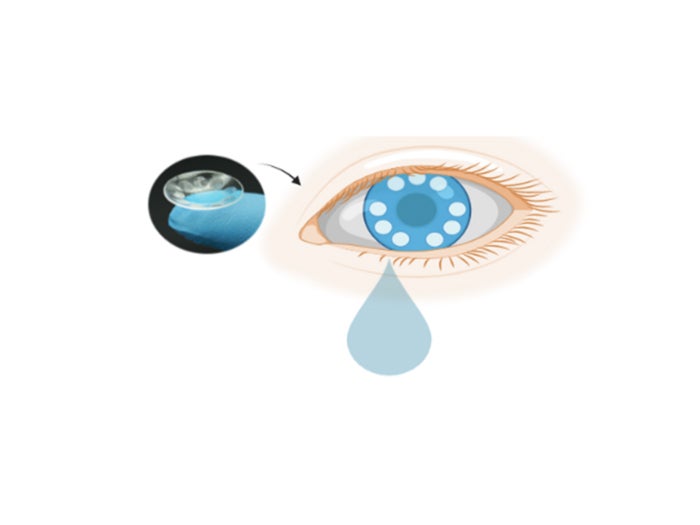Scientists create smart contact lenses that ‘diagnose cancer’
The revolutionary device could open the door to an inexpensive ‘one size fits all’ screening programme for multiple types of the disease

Your support helps us to tell the story
From reproductive rights to climate change to Big Tech, The Independent is on the ground when the story is developing. Whether it's investigating the financials of Elon Musk's pro-Trump PAC or producing our latest documentary, 'The A Word', which shines a light on the American women fighting for reproductive rights, we know how important it is to parse out the facts from the messaging.
At such a critical moment in US history, we need reporters on the ground. Your donation allows us to keep sending journalists to speak to both sides of the story.
The Independent is trusted by Americans across the entire political spectrum. And unlike many other quality news outlets, we choose not to lock Americans out of our reporting and analysis with paywalls. We believe quality journalism should be available to everyone, paid for by those who can afford it.
Your support makes all the difference.‘Smart’ contact lenses that have the potential to diagnose early stage cancer through tumour identifying chemicals found in tears have been created by scientists.
The device could open the door to an inexpensive ‘one size fits all’ screening programme for multiple types of the disease.
The technology captures transporters called ‘exosomes’, which are tiny bubble-like messengers contained within cells in our bodies secreted into blood, saliva, urine, and tears.
On the surface are a wealth of proteins - some fuelled by cancer, viral infections or injury.
Exosomes can influence tumour regulation, progression and spread - offering hope of more targeted and effective treatment.
A reduction in treatment delay dramatically improves cancer survival rates, with every month without treatment estimated to raise risk of mortality by around ten percent.
Project leader Professor Ali Khademhosseini, of the Terasaki Institute for Biomedical Innovation in the United States, where the diagnostic lenses were developed, said: “The lens can detect exosomes in various solutions from various cell lines - and human tears.
“They can differentiate expression of surface proteins as cancer biomarkers.”
The eyeglass is fitted with microchambers bound to antibodies which exosomes stick to.
In experiments, the device was successfully tested on exosomes secreted into lab liquids from ten different tissue and cancer cell lines, as well as tears from ten human volunteers.
Professor Khademhosseini said: “The lens can be stained with nanoparticle-tagged specific antibodies for selective visualisation.
“This offers a potential platform for cancer pre-screening and a supportive diagnostic tool that is easy, rapid, sensitive, cost-effective and non-invasive.”
Exosomes were once thought to be the dumping grounds for unwanted materials, but it is now known they carry different biomolecules between cells.
Professor Khademhosseini said: “They are a rich source of markers which can be targeted for several biomedical applications.
“The methodology our team has developed greatly facilitates our ability to tap into this source.”
Previous attempts to harness their importance have been hampered by problems in isolating enough to provide sufficent information.
Current methods involve tedious, complicated, time-consuming and costly equipment - taking at least ten hours to complete.
The US team’s simple technique eliminates these issues. What’s more, tears are a cleaner and more reliable source of exosomes than other bodily fluids.
Both the chambers and lens were built using direct laser cutting and engraving rather than conventional cast molding.
In addition, they chemically modified the surfaces to activate them for antibody binding.
Standard methods involve metallic or nano-carbon materials in expensive clean-room settings.
The exosomes are scanned using a pair of antibodies on gold nano-particles so potental signs of cancer can be visualised.
Both are specific for two different surface markers found on all exosomes, explained Prof Khademhosseini.
Further analysis showed the lens identified exosomes in solutions from three cell lines with varying surface markers and using different combinations of antibodies.
Professor Khademhosseini said: “The resultant patterns of detection and non-detection of exosomes from the three different cell lines were as expected.
“It validated its ability to accurately capture and detect exosomes with different surface markers.”
He described the results in Advanced Functional Materials as “encouraging.”
Professor Khademhosseini added that the next generation smart contact lens is a promising “easy-to-use, rapid, noninvasive monitoring platform of cancer pre-screening and supportive diagnosis.”



Join our commenting forum
Join thought-provoking conversations, follow other Independent readers and see their replies
Comments